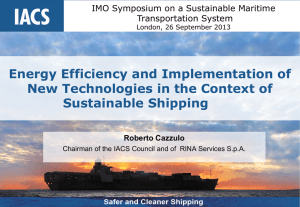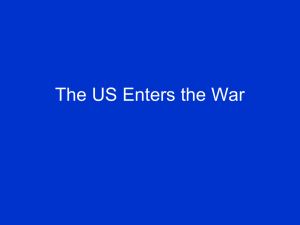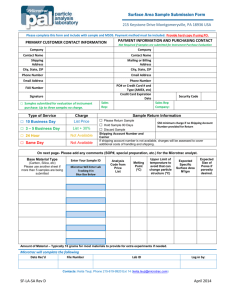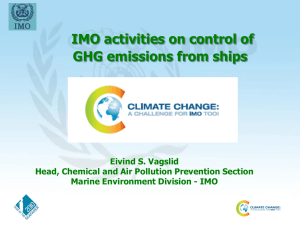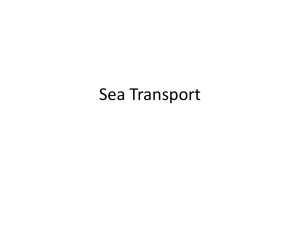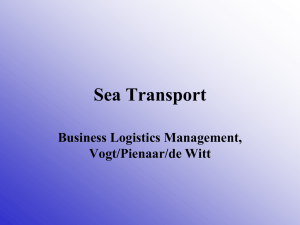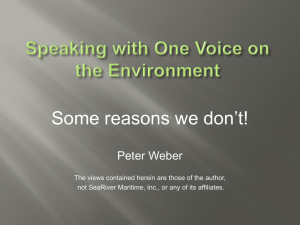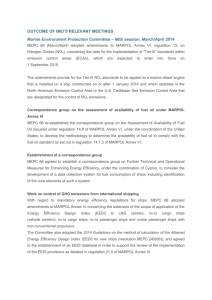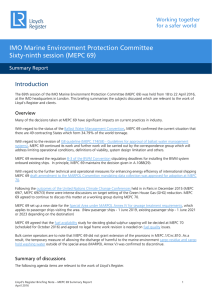CSC Submission to IMO on periodic review of NGOs` status
advertisement
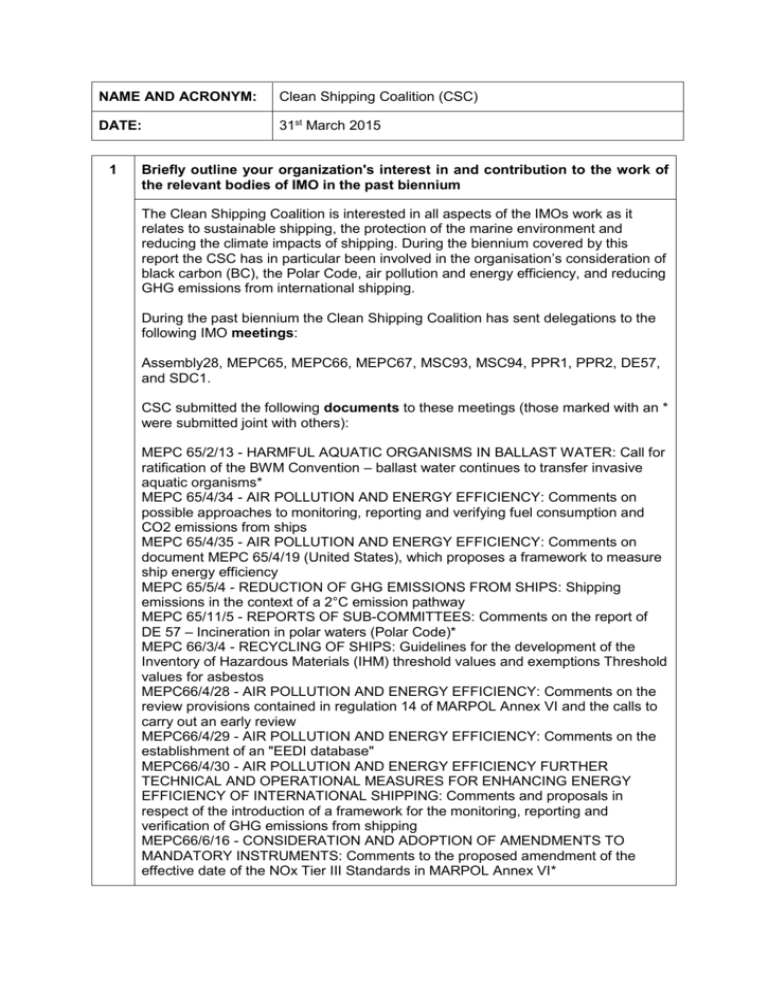
NAME AND ACRONYM: Clean Shipping Coalition (CSC) DATE: 31st March 2015 1 Briefly outline your organization's interest in and contribution to the work of the relevant bodies of IMO in the past biennium The Clean Shipping Coalition is interested in all aspects of the IMOs work as it relates to sustainable shipping, the protection of the marine environment and reducing the climate impacts of shipping. During the biennium covered by this report the CSC has in particular been involved in the organisation’s consideration of black carbon (BC), the Polar Code, air pollution and energy efficiency, and reducing GHG emissions from international shipping. During the past biennium the Clean Shipping Coalition has sent delegations to the following IMO meetings: Assembly28, MEPC65, MEPC66, MEPC67, MSC93, MSC94, PPR1, PPR2, DE57, and SDC1. CSC submitted the following documents to these meetings (those marked with an * were submitted joint with others): MEPC 65/2/13 - HARMFUL AQUATIC ORGANISMS IN BALLAST WATER: Call for ratification of the BWM Convention – ballast water continues to transfer invasive aquatic organisms* MEPC 65/4/34 - AIR POLLUTION AND ENERGY EFFICIENCY: Comments on possible approaches to monitoring, reporting and verifying fuel consumption and CO2 emissions from ships MEPC 65/4/35 - AIR POLLUTION AND ENERGY EFFICIENCY: Comments on document MEPC 65/4/19 (United States), which proposes a framework to measure ship energy efficiency MEPC 65/5/4 - REDUCTION OF GHG EMISSIONS FROM SHIPS: Shipping emissions in the context of a 2°C emission pathway MEPC 65/11/5 - REPORTS OF SUB-COMMITTEES: Comments on the report of DE 57 – Incineration in polar waters (Polar Code)* MEPC 66/3/4 - RECYCLING OF SHIPS: Guidelines for the development of the Inventory of Hazardous Materials (IHM) threshold values and exemptions Threshold values for asbestos MEPC66/4/28 - AIR POLLUTION AND ENERGY EFFICIENCY: Comments on the review provisions contained in regulation 14 of MARPOL Annex VI and the calls to carry out an early review MEPC66/4/29 - AIR POLLUTION AND ENERGY EFFICIENCY: Comments on the establishment of an "EEDI database" MEPC66/4/30 - AIR POLLUTION AND ENERGY EFFICIENCY FURTHER TECHNICAL AND OPERATIONAL MEASURES FOR ENHANCING ENERGY EFFICIENCY OF INTERNATIONAL SHIPPING: Comments and proposals in respect of the introduction of a framework for the monitoring, reporting and verification of GHG emissions from shipping MEPC66/6/16 - CONSIDERATION AND ADOPTION OF AMENDMENTS TO MANDATORY INSTRUMENTS: Comments to the proposed amendment of the effective date of the NOx Tier III Standards in MARPOL Annex VI* MEPC67/5/7 - FURTHER TECHNICAL AND OPERATIONAL MEASURES FOR ENHANCING ENERGY EFFICIENCY OF INTERNATIONAL SHIPPING: The role of transparency in regulation and the promotion of economic activity: A background document for IMO and the shipping sector MEPC67/5/8 - FURTHER TECHNICAL AND OPERATIONAL MEASURES FOR ENHANCING ENERGY EFFICIENCY OF INTERNATIONAL SHIPPING: Transparency will drive ship efficiency and help reduce costs MEPC67/5/9 - FURTHER TECHNICAL AND OPERATIONAL MEASURES FOR ENHANCING ENERGY EFFICIENCY OF INTERNATIONAL SHIPPING: The case for further measures to tackle the climate impacts of shipping MEPC67/9/9 - MANDATORY CODE FOR OPERATING SHIPS IN POLAR WATERS: Environmental protection in the Polar Code* MEPC 67/12/8 - REPORTS OF SUB-COMMITTEES: Outcome of PPR 1 Black Carbon definition and measurement: the way forward MEPC 67/INF.31 - REPORTS OF SUB-COMMITTEES: Outcome of PPR 1 Definition and measurement of Black Carbon from ships Summary of recent peerreviewed scientific assessment of Black Carbon MSC94/3/17 - CONSIDERATION AND ADOPTION OF AMENDMENTS TO MANDATORY INSTRUMENTS: Category C ships in the draft Polar Code* PPR 2/8/1 - CONSIDERATION OF THE IMPACT ON THE ARCTIC OF EMISSIONS OF BLACK CARBON FROM INTERNATIONAL SHIPPING: Definition and approaches to Black Carbon measurement methods DE 57/11/11 - DEVELOPMENT OF A MANDATORY CODE FOR SHIPS OPERATING IN POLAR WATERS: Heavy fuel oil use by vessels in Arctic waters* DE 57/11/20 - DEVELOPMENT OF A MANDATORY CODE FOR SHIPS OPERATING IN POLAR WATERS: Inclusion of a black carbon regulation as part of the mandatory Code for ships operating in polar waters* CSC held the following side events at these meetings: MEPC65: The Multiple Benefits of Reduced Ship Speed MEPC66: The economic impacts of fuel and emissions MRV in maritime transport MEPC67: The energy efficiency of newly built ships: what's happened? The CSC also participated in the following working/drafting/correspondence groups: MEPC65 Working Group on MEPC resolution on technical co-operation and transfer of technology MEPC65 WG on Air pollution and energy efficiency MEPC66 WG on Air pollution and energy efficiency MEPC66 WG on Further energy efficiency measures for ships MEPC67 WG on the Polar Code MEPC67 WG on Air pollution and energy efficiency MEPC67 WG on Further technical and operational measures for enhancing energy efficiency of international shipping MSC93 WG on the Polar Code MSC94 joint WG on the Polar and IGF Codes DE57 WG on the Polar Code PPR2 WG on Prevention of air pollution from ships PPR1 WG on Prevention of air pollution from ships MEPC Correspondence Group on EEDI Review MEPC CG on Fuel Availability MEPC CG on further technical and operational measures for enhancing energy efficiency MEPC CG on the Polar Code 2 Briefly outline how your organization disseminates information on and promotes the work of the Organization to its membership and/or beyond The Clean Shipping Coalition promotes its activities and the activities of its members and the IMO on its website (http://www.cleanshipping.org/), via press work, publications, and at events organised by its member organisations. Since CSC is a membership organisation and its members are other environmental organisations these members (http://www.cleanshipping.org/members/) also have their own web sites and do their own outreach and communications guaranteeing a very extensive reach. In support of their work at IMO CSC members routinely commission research and analysis and this is made available to the general public and of course to IMO member states via submission to one or other of the IMO committees. A good recent example of this kind of work can be found in document MEPC68/Inf.25, where two CSC members (Seas At Risk and Transport & Environment) have commissioned new analysis of the energy efficiency of recently built ships. This study is available on their own websites, on the CSC website and also on the website of the consultants who undertook the work.
